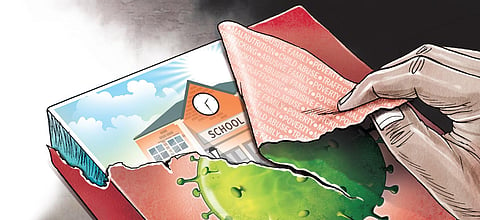

The Unlock 3 guidelines released on 29 July 2020 allowed many activities including commercial operations to restart, but kept schools closed. As per news reports, the Centre is in consultation with state governments, the health ministry and parents to draft guidelines around school reopening. However, parents and some states are reluctant because of concerns over the health of children.
The nationwide lockdown has closed over 1.5 million schools and impacted 24 crore students across India. It has forced parents, educators and policymakers to choose between the education and health of children. In other countries, schools serve as centres of learning and the primary purpose is the teaching of a certain curriculum. In these countries, the trade-off between health and education holds. The same thinking, however, cannot be applied to India.
Over the years, multiple policy interventions have bundled child healthcare with the schooling system in India. About 13 lakh anganwadis across the country provide 6.4 crore children under the age of six with hot, nutritious meals and vaccinations. Mid-day meals provided to over 9.8 crore children studying in government schools keep malnutrition and stunted growth at bay.
It has been estimated that over 2 lakh children have missed the BCG and pentavalent vaccines because of the lockdown. Not only are children not being immunised, but many may also be forced to work by families standing at the precipice of poverty. It is likely that the children who start working now may never come back to schools.
Closing schools also exacerbates the existing problems of child abuse and trafficking. Children staying at home are vulnerable to abusive family members and have neither the escape of the school nor the support structure of teachers and friends. The Childline 1098 helpline saw a 50% increase in the number of calls received since the lockdown started. The Kailash Satyarthi Foundation surveyed 53 NGOs working with children and found that 89% of them anticipated a rise in trafficking and 64% expected a rise in child marriage after the lockdown.
In addition to providing education, schools also enable parents, especially mothers, to find meaningful work. Extended school closures are forcing women to quit their jobs and engage in full-time childcare. This will accelerate India’s declining female labour force participation rate. Losing an additional source of income will also force households back into poverty. To mitigate this, the Union and state governments can take lessons from the Andhra Pradesh government’s Jagananna Amma Vodi scheme. In January 2020, over 42 lakh mothers from BPL households were given a direct benefit transfer of Rs 15,000 for sending their children to school.
Learning during school closures has also suffered. Even though governments, schools and teachers work hard to make alternative means of education work for all students, structural problems around internet access impede their efforts. The National Statistics Office reported that in 2017-18, only 23.8% of households had access to the web and only 20% of those aged five and above were able to use a computer. A recent NCERT survey conducted among 18,188 students revealed that 27% of students do not have smartphones and laptops, and 30-50% of the students found online learning difficult or burdensome.
It is time to create a plan for the nationwide reopening of schools. The UNICEF’s Framework for Reopening of Schools released in June 2020 offers guidance on this and divides the reopening plan into three phases: Prior to reopening, during reopening and after reopening. The first stage involves identifying schools for reopening based on local conditions of transmission. A phased reopening plan with schools opening for certain days of the week or for certain grades should be made. Simultaneously, guidelines around social distancing and hygiene practices should be formulated.
As schools reopen, student attendance must be monitored to ensure all students, especially the marginalised, re-join. Economic distress will force parents to send their children to government schools as private schools become unaffordable. This will require investments in government school infrastructure. Andhra’s Mana Badi-Nadu Nedu scheme serves as a model, under which 15,715 government schools are being upgraded at a sanctioned cost of Rs 3,523 crore for hygiene, classrooms and English lab facilities.
With schools reopened, teachers must be supported so that they can effectively make up for the learning gap and monitor whether students are following social distancing norms. Syllabi and examinations can also be rationalised to retain focus on core curriculum. Local level bureaucracy must prepare a decision model for the opening and closing of a school due to a resurgence of the virus in the future. Finally, investments in blended education, with a focus on digital and remote education, must be made so that schools are ready for closures in the future.
Policymakers and school authorities should consider classes in shifts, which is already followed in government schools in AP. Classes run in two alternate shifts spread over the day. Private schools can give parents the option, based on access to digital resources, whether to send their child to school. This will ensure that even those who do not have the digital resources are able to learn. The ability to reopen schools shall also depend greatly on the ability to rapidly test and isolate infected students. This is necessary to create a safe space for students and give confidence to parents, teachers and school staff.
The pandemic risks not only the education but also the health and well-being of our children. By ignoring their health needs, we are doing a great injustice to their present and future. Let us ensure that we don’t look back at this crisis as the time where we set up our children for sickness and economic failure later in life. It is time to safely reopen schools and secure our children’s future.
Lavu Sri Krishna Devarayalu
YSRCP MP from Narasaraopet, Andhra Pradesh
(krishna.lavu@yahoo.in)